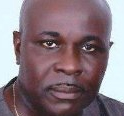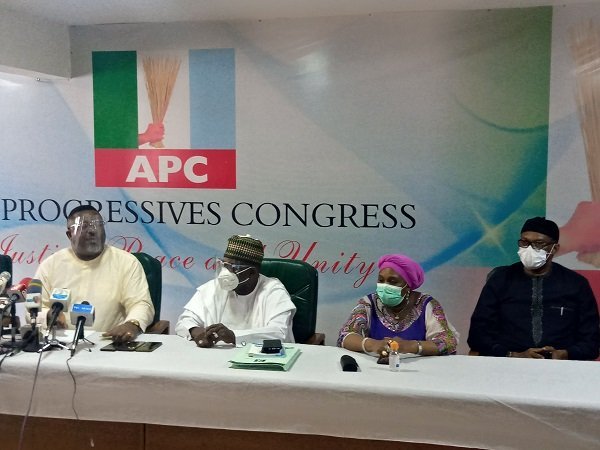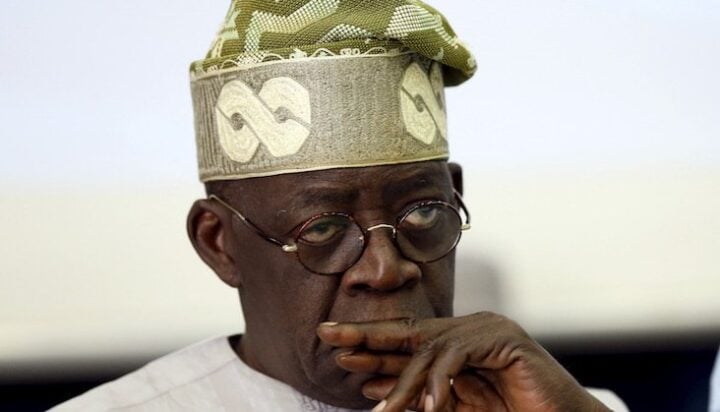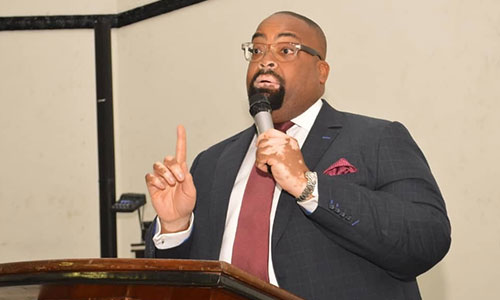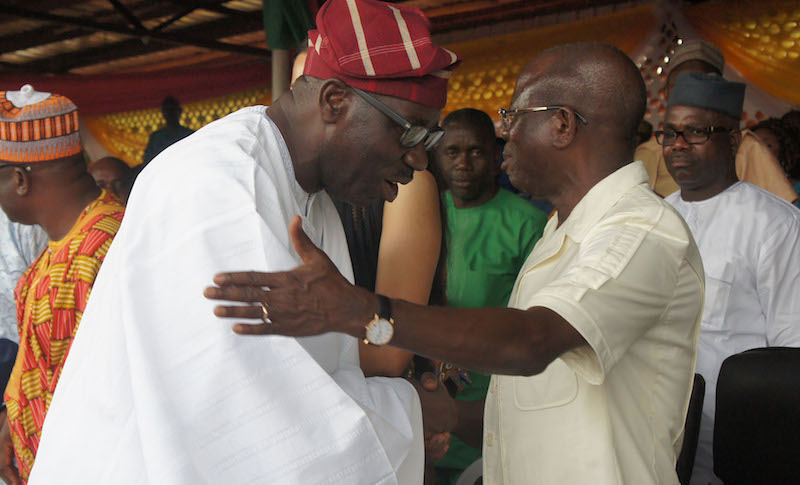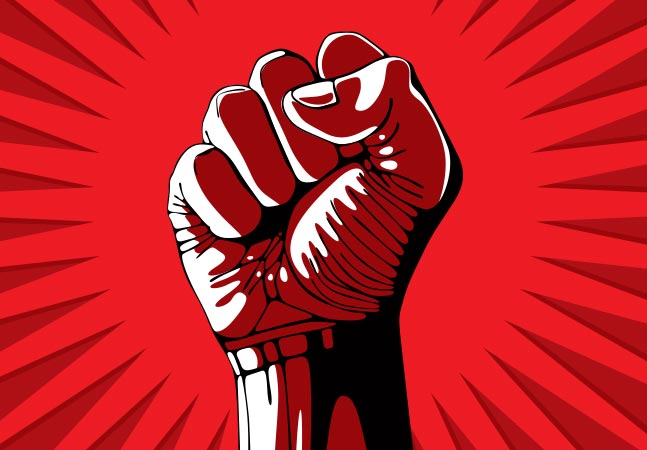The latest round of crisis in the ruling All Progressives Congress (APC) has reportedly led to the Inspector-General of Police, IGP, Mohammed Adamu, ordering the seal off of the party’s National Secretariat. The crisis was triggered by the intractable face-off between the party’s (suspended?) National Chairman Adams Oshiomhole and his successor as Edo State Governor Godwin Obaseki,
Shortly after the Appeal Court upheld a lower’s court ruling suspending Comrade Adams Oshiomhole as APC’s National Chairman, the party announced the Deputy National Chairman (South), Abiola Ajimobi, as the Acting Chairman of the party. The following day, the Deputy National Secretary of the party, Victor Giadom, said to be a protégé of Transport Minister Rotimi Amaechi, and backed by a court order, declared himself Acting National Chairman of the party. Majority of the members of the APC’s National Working Committee (NWC), (rumoured to be loyal to the Tinubu/Oshiomhole tendency in the party) came out to ratify Ajimobi’s appointment but said that since the former Oyo State Governor has been hospitalized, that the party’s National Vice Chairman (South-South), Hilliard Ita should stand in for him. Interestingly, another group emerged and declared that the position of APC Deputy National Chairman (South), which Ajimobi was said to occupy, was actually vacant and therefore, Ajimobi’s purported appointment as Acting National Chairman was a nullity. Though frictions and power struggles among the dominant tendencies in the APC had been going on since the formation of the party on February 6 2013 through a merger of a number of legacy regional parties, there are a number of issues and useful lessons from this current round of crisis:
One, the APC was never a political party in a classic sense of the word. It was and remains a fragile coalition of disparate groups and groupings united by a common ambition to defeat President Jonathan and the PDP during the 2015 presidential election. It was to that extent merely a special purpose vehicle for capturing power. With that objective achieved, it is normal that the secondary contradictions that were papered over during the ‘struggle’ would come to the fore.
Two, as the APC re-engineers to become a true political party rather than a coalition of disparate interests, it is not abnormal that it will be engulfed in a number of internal crisis, with many of the founders leaving the party or being pushed out. This is what is meant by the dictum that every revolution, like Saturn, devours its children. History bears this out: the Cultural Revolution in China, the Night of Long Knives in Nazi Germany, Stalin’s purge in Russia or the case of Imre Nagy, the highly respected former Hungarian head of state, who was the symbol of the country’s uprising against Soviet rule in 1956 but who ended up being hanged for treachery by his country’s communist leaders.
Advertisement
Three, compared to the rival PDP (which is also not built on any known philosophy other than winning power), crises in the PDP may not be as damaging as it is for APC because it is less built around the aura of individuals than the APC. While the APC is built essentially around the aura of some personalities (Buhari, Tinubu, El Rufai, Rotimi Amaechi etc), the PDP is more a national alliance of dominant ethnic and regional factions of the political elite, and therefore has more ‘natural’ structures than the APC. Though the party may be captured momentarily by forces that provide funds and gravitas (such as Governor Nyesom Wike), the party is likely to survive even when such forces have played their parts and moved on. This cannot be said of the APC at the moment. No one knows what will be the fate of the party without Buhari – and to a less extent Tinubu.
Four, one of the major sources of crisis in the party (and also in the PDP) is a desire by the party to impose its notion of ‘party supremacy’. There are two main perspectives when politicians brandish the phrase ‘party supremacy’: there are those who believe that before an election, the supremacy of the party over its candidates for offices should be unquestionable but that once the candidates win elections, they should be allowed to be guided by their conscience. There are however others who believe that the decision of a political party must be abided by its members before and after elections because the party provided the platform on which its elected members ascended to power.
Both perspectives represent only partial views of a complex reality. For instance, in parliamentary systems where the notion of the supremacy of the party is strongest, there is what is called ‘conscience’ or ‘free’ vote where parliamentarians are allowed to follow their conscience in voting. In the run-up to the Iraq war in 2003 for instance, several Tory and Labour MPs in the UK defied their parties and voted against the war.
Advertisement
For those who believe that the party should be supreme at all times, this is often based on an erroneous assumption that in our type of societies parties are structured and institutionalized around core beliefs or that they are neutral arbiters in the intra-elite competitions for power, glory and lucre. Thus while many people know what the Labour and Conservative parties stand for in the UK or what the Republicans and the Democrats stand for in the USA, the same cannot be said of our parties. Like the general society where the absence of strong institutions means that organizations are often controlled by the ‘strong man’ or a cabal, Nigerian parties are also controlled by strong individuals and competing oligarchs. In essence what people call ‘party supremacy’ is merely the projection of the interests of the oligarchic group that controls the party structures at any point in time. Essentially, Nigerian political parties have failed to properly articulate what party supremacy should mean in our type of environment.
Five, was it right of President Buhari to apparently remain aloof while the crisis in the party festered? In 2015 when the party was in turmoil over the election of officers of the National Assembly, the President reportedly called on the feuding politicians to “sheath their ambitions.” He is reported to have held some meetings with the contending groups in the Oshiomhole-Obaseki feud. While we can only speculate on what he told the various groups, we can surmise that, like he did in 2015, he pleaded with the feuding politicians to “sheath their ambitions.” With all due respect, I am not sure this will be an effective way of resolving the dispute because it assumes, not correctly in my opinion, that politicians are primarily driven by a sense of altruism and patriotism. I believe that any serious analysis of the political behaviour of Nigerian politicians must start from their enlightened self-interest. Politicians do not “sheath their ambitions”. They retreat if the structural constraints do not permit the realization of such ambitions or the cost of pursuing that ambition has become unbearable. Since politicians are not in politics for the heck of it, you cannot sermonize to them to forget their ambitions (especially when you are not offering any compensation to those who “sheath” their own ambitions) and expect them to obey you.
Six, presidential spokesman Femi Adesina said Buhari’s strategy is to allow these crises to run their course. According to him, “if the people are in entrenched positions and refuse to shift ground, what would the President do as a democrat? You allow the process to run its course.” Put plainly Adesina is telling us that President Buhari does not like to break-up a fight. While the strategy of not breaking up a fight until it has run its course may work with two stubborn teenagers who are hell-bent on going after each other despite pleas from adults (who will of course be keeping an eye to ensure the fight does not degenerate to dangerous level), to use that strategy at a political or national level has negative undertones because to be a good crisis manager is globally recognized as one of the attributes of effective leadership. In fact, politics by definition is a contact sport and consequently has more pronounced conflicts than in many other spheres of life. The acme of political leadership is precisely to use the force of one’s personality and the aura of one’s office to manage these conflicts such that they do not constitute a public embarrassment as seems to be the case with the current round of APC crisis. Of course it is never a tea party managing the egos of political oligarchs. It becomes even more daunting when the National Chairman of the party, who should be skilfully managing the egos of such political combatants, himself has a terribly over-sized ego without a corresponding skill in ‘diplomatese’.
Email: [email protected]
Advertisement
Twitter: @JideoforAdibe
N/B: This article was written before Buhari threw his weight behind Giadom as the party’s acting national chairman – to the consternation of the party’s national working committee.
Advertisement
Views expressed by contributors are strictly personal and not of TheCable.
Add a comment
